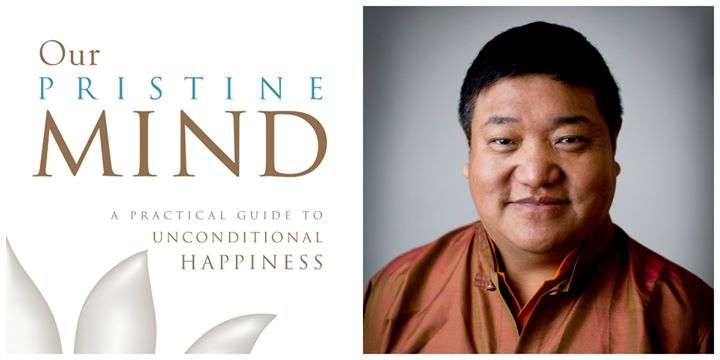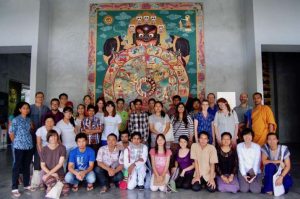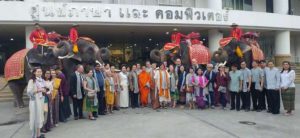
I was recommended Orgyen Chowang Rinpoche’s book Our Pristine Mind: A Practical Guide to Unconditional Happiness by Raymond Lam, Buddhistdoor Global’s senior writer. Published in 2016 by Shambhala Publications, the book is based on the author’s teachings and retreats conducted at Napa Valley in California, which span a period of many years from 1999 onwards. He first coined the term “Pristine Mind” in 2011.
The book is divided into five chapters; “Pristine Mind: Our Fundamental Nature,” “Realization: revealing Our Pristine Mind,” Meditation: The Journey Deeper into Pristine Mind,” “A Good Heart: The Companion to Pristine Mind,” and “Enlightenment: Fully Awakened Pristine Mind.”
Originally I wasn’t aware that I had seen the author before. Then I remembered that I had listened to his speech at a public forum, held at The University of Hong Kong (HKU) on 14 March 2015. The forum was titled, “Verses of Love: Buddhist, Christian, and Islamic Poets on Embracing ‘the Other’.” Buddhistdoor Global, the now non-active Anatolia Cultural & Dialogue Centre, and HKU’s Centre of Buddhist Studies jointly hosted this interfaith dialogue. So no wonder the name sounded so familiar to me.
Orgyen Chowang Rinpoche, also known as Khen Rinpoche, is a meditation master in the Dzogchen lineage of the Vajrayana Buddhist tradition. He started his training at the age of fourteen at Larung Gar in Serta, eastern Tibet, under his preceptor, the great Dzogchen master Jigme Phuntsok Rinpoche. In 1990, Rinpoche completed the studies, practice, and meditation training required for the khenpo degree, the highest degree of Vajrayana studies. In late 1995, he was invited to the United States by Thinley Norbu Rinpoche, a highly esteemed teacher and author, and in 2011 he established the Pristine Mind Foundation in the United States.
I read the book and listened to a talk by Orgyen Chowang given on 16 March 2017, at Google HQ in Mountain View, California. A video of the speech can be found on YouTube. One thing he said struck me: “Just as we can enjoy the pristine water or a pristine environment, we can enjoy the experience of our Pristine Mind. When our mind is pristine, it is a completely stress-free state and happiness is present all the time. Our happiness is not conditional. It is unconditional and comes from within.” (YouTube, “Talk at Google”)
In the book, he writes, “Pristine Mind is the mind we were all born with, our natural mind. It is called Pristine Mind because it is untouched and unspoiled by experiences. It is inherently and permanently pure. It is like pristine land that has not been altered by civilization. In Pristine Mind our senses are vibrant and alive, our perceptions pure. Things that cause us fear or insecurity in our ordinary mind do not affect us negatively when we are in Pristine Mind, because of its innate security.” (Chowang 2016, 11)
The main issue therefore is that we are usually in the mode of ordinary mind rather than that of Pristine Mind. The objective of the book is to guide us, through changing our ways of thinking and meditation, to rest in Pristine Mind all the time for the rest of our lives rather than only during fortunate moments of practice. Most of us do not realize our mind’s true nature; therefore, our minds are hopelessly polluted, miring us in delusion and insecurity. Orgyen Chowang Rinpoche also eloquently notes how it is not necessary to reject all worldly pleasures. Rather, we should be mindful of the much more important problem of “primordial fear.” “Primordial fear manifests in many ways. If you have anxious feelings without an apparent cause, or if you feel uneasy and restless unless you are constantly engaging with other people in person or online, then you are experiencing primordial fear.” (Ibid, 19) Therefore Rinpoche advises us to peel away the outer layers of mental events that obscure our Pristine Mind.
But although Pristine Mind is defined as inherent and natural, Rinpoche is at odds to stress that this purity requires practice to be uncovered. Accomplishing the latter requires a gradual untying of the habits that have bound us into cyclical neuroses and primordial fear. “It is important to understand, however, that our ordinary mind and the unhealthy ego that often controls it do not easily give up their power to dictate our thoughts and perceptions.” (Ibid, 51) While Part Two offers a guided Pristine Mind meditation, Part Three details how to abide in Pristine Mind: “To continue to uncover our pristine, clear, calm state of mind, we need to orient out meditation around the four steps introduced by Guru Rinpoche Padmasmbhava. . . . Don’t follow the past. . . . Don’t anticipate the future. . . . Remain in the present moment. . . . Leave your mind alone.” (Ibid, 93-94)
Part Four highlights the aspects of a good heart as an accompaniment to Pristine Mind, and Chapter Five is noteworthy because it discusses the Buddhist goal of enlightenment in the context of the Four Stages of Awakening: 1) momentary experiences of resting in their fundamental nature, 2) thoughts and emotions losing their strength to a noticeable extent, 3) mental events no longer having any impact (positive or negative), and 4) the culmination of Pristine Mind, with no impurity, distortion, ego, or any imperfection. By this point, our mind is completely aligned with reality—the final accomplishment of the Buddhist path. Primordial fear has been vanquished.
I would say the book is a guide to the path of the author’s experience of insight via Pristine Mind. It will guide readers to be truly happy and enables us to find the Buddhist meaning of life. To me, the author expresses his teachings in this book beautifully. His eloquence and profundity will encourage others to experience the peaceful nature of Pristine Mind and unconditional happiness for themselves.
Reference
Chowang, Orgyen. 2016. Our Pristine Mind: A Practical Guide to Unconditional Happiness. Boulder: Shambhala Publications, Inc.
See more
Orgyen Chowang Rinpoche (Pristine Mind Foundation)
Orgyen Chowang: “Our Pristine Mind: A Practical Guide to Unconditional Happiness” | Talks at Google (YouTube)
Related features from Buddhistdoor Global
Loving your Tick: Book Review of Mindfulness as Medicine
Book Review: Approaching Buddhism—An Introduction to the Buddhist Tradition from the Pure Land Perspective
Book Review: Wendy Garling’s Stars at Dawn











